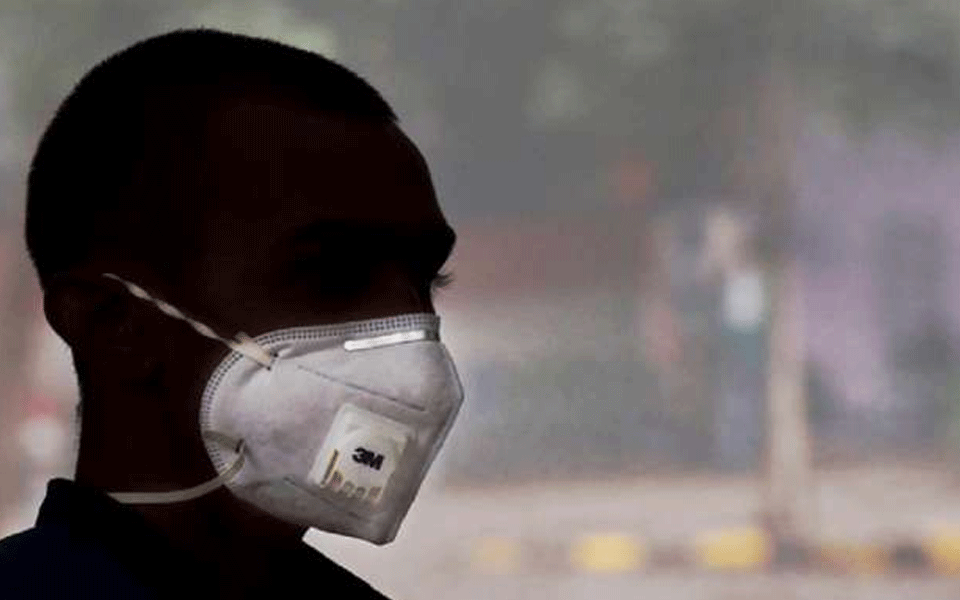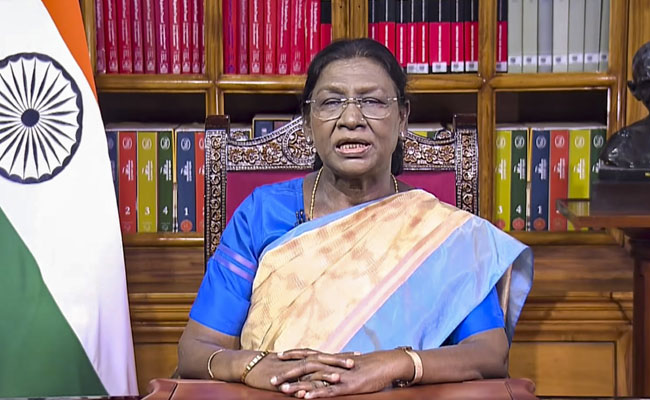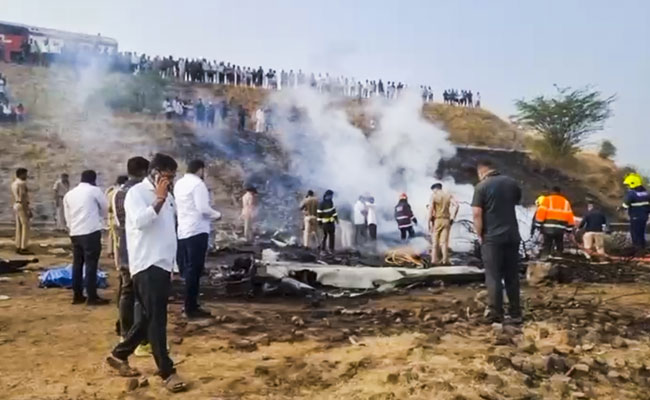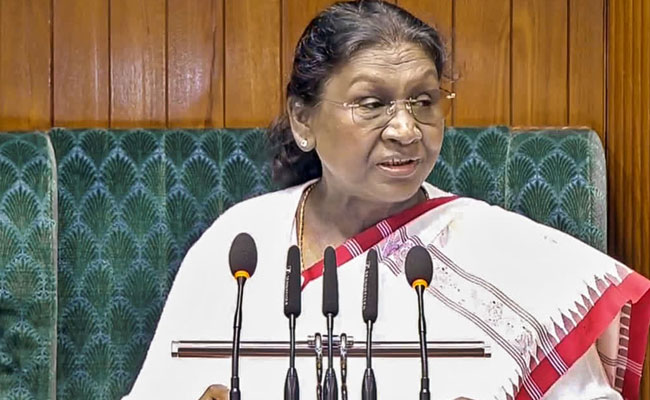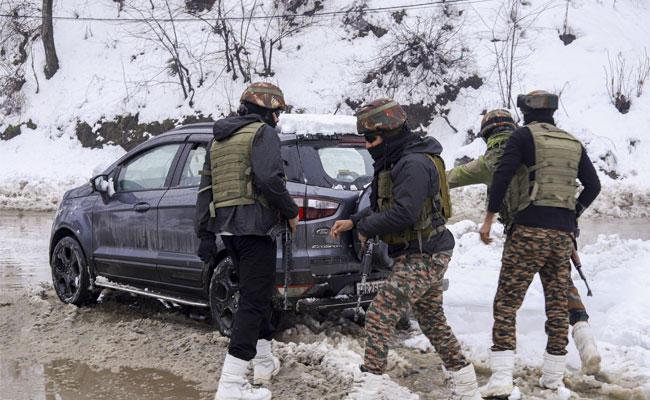New Delhi: N95 masks may be the most effective at reducing the spread of the novel coronavirus, according to a study by researchers, including those from the Indian Space Research Organisation (ISRO), which suggests that any mask is better than no mask at preventing COVID-19.
The researchers noted that airborne transmission by respiratory aerosol droplets produced during coughing and sneezing is the dominant mode of spreading for infectious diseases such as COVID-19.
Padmanabha Prasanna Simha, from ISRO, and Prasanna Simha Mohan Rao, from the Sri Jayadeva Institute of Cardiovascular Sciences and Research in Karnataka, experimentally visualised the flow fields of coughs under various common mouth covering scenarios.
The, study published in the journal Physics of Fluids, found N95 masks to be the most effective at reducing the horizontal spread of a cough.
The N95 masks reduced a cough's initial velocity by up to a factor of 10, and limit its spread to between 0.1 and 0.25 meters, the researchers said.
An uncovered cough, in contrast, can travel up to three metres, but even a simple disposable mask can bring this all the way down to 0.5 metres, they said.
"If a person can reduce the extent of how much they contaminate the environment by mitigating the spread, it's a far better situation for other healthy individuals who may enter places that have such contaminated areas," Simha said.
Rao and Simha noted that density and temperature are intricately related, and coughs tend to be warmer than their surrounding area.
They utilised a technique called schlieren imaging, which visualises changes in density, to capture pictures of voluntary coughs from five test subjects.
By tracking the motion of a cough over successive images, the team estimated velocity and spread of the expelled droplets. N95 masks have the best effectiveness and completely contain the horizontal spread to between 0.1 and 0.25 metres, researchers said.
A disposable surgical mask greatly reduces this distance to between 0.5 and 1.5 metres, they said.
"Even if a mask does not filter out all the particles, if we can prevent clouds of such particles from traveling very far, it's better than not doing anything," said Simha.
"In situations where sophisticated masks are not available, any mask is better than no mask at all for the general public in slowing the spread of infection," said Simha.
The researchers also contradict the generally accepted notion that using an elbow to cover up a cough is a good alternative. The found that unless covered by a sleeve, a bare arm cannot form the proper seal against the nose necessary to obstruct airflow.
The researchers added that a cough is able to leak through any openings and propagate in many directions.
Simha and Rao hope their findings will put to rest the argument that regular cloth masks are ineffective, but they emphasise that masks must continue to be used in conjunction with social distancing.
"Adequate distancing is something that must not be ignored, since masks are not foolproof," Simha added.
Let the Truth be known. If you read VB and like VB, please be a VB Supporter and Help us deliver the Truth to one and all.
New Delhi (PTI): President Droupadi Murmu on Wednesday said the world saw the valour of Indian armed forces through Operation Sindoor when they destroyed terror camps on the strength of their own resources and asserted that any terror act will be responded with decisive action.
"India has proved that power can be used with responsibility and wisdom. The world has seen the valour and courage of Indian armed forces through Operation Sindoor," Murmu said in her address to both Houses of Parliament, marking the beginning of the Budget Session.
"Our nation, on the strength of our own resources, destroyed terror camps. My government sent a message that any act of terror will be responded to with resolute and decisive action," the President said, amid thumping of desks by Prime Minister Narendra Modi and other parliamentarians.
Murmu said the suspension of the Indus Water Treaty was part of India's fight against terror.
"We are also working on Mission Sudarshan Chakra to further strengthen national security," the President said, adding that security forces have also taken decisive action against Maoist terror.
Following Operation Sindoor, she said, the trust on Indian defence platforms has increased.
Murmu further said her government was committed to social justice in the country.
In the third term of the government, she said, work is being done to further empower the poor, and social security benefits are available to nearly 95 crore citizens now.
"My government is committed to true social justice," she said, adding that 25 crore Indians moved out of poverty in the last 10 years.
The President also said the government has been successful in tackling corruption and scams, and ensuring proper use of public funds.
"For India, the end of the first 25 years of this century has been filled with several successes, proud achievements and extraordinary experiences. In the last 10-11 years, India has strengthened its foundation in every sector," she said.
Lauding India's celebration of the 350th martyrdom day of the ninth Sikh guru, Guru Tegh Bahadur, and the country's tribute to revered tribal leader and freedom fighter Birsa Munda on his 150th birth anniversary, Murmu said, "when the country remembers the contribution of its ancestors, the new generation gets inspiration, which further speeds up our journey towards Viksit Bharat (Developed India)."
"The country celebrated the 350th Shaheedi Diwas of Sri Guru Tegh Bahadur Ji. During the 150th birth anniversary of Birsa Munda, the entire country paid him tribute and remembered his contribution to the tribal community," the President said.
"The events related to the 150th birth anniversary of Sardar Vallabhbhai Patel further strengthened the sense of Ek Bharat, Shresht Bharat (One India, Best India). The entire country became witness to how Bharat Ratna Bhupen Hazarika's birth anniversary celebrations filled the country with music and a sense of unity," Murmu said.
The President's mention of the Viksit Bharat – Guarantee for Rozgar and Ajeevika Mission (Gramin) (VB-G RAM G) scheme was met with loud protests from the Opposition benches.
Murmu said the VB-G RAM G initiative would provide guarantee for 125 days of work, would stop corruption and leakages, and provide a new impetus to rural development.
The Opposition members raised slogans demanding its rollback, even as the treasury benches thumped their desk in support of the scheme.
The President had to take a brief pause amid opposition cries of "vapas lo" (roll back) against the Act that replaced the Mahatma Gandhi National Rural Employment Guarantee Act (MGNREGA).
The Opposition parties have been demanding withdrawal of the VB-G RAM G Act and restoration of MGNREGA as a rights-based law in its original form, the right to work and the authority of panchayats.
The government has, meanwhile, claimed that the new Act will further strengthen the guarantee for rural employment.

